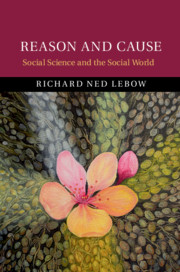
-
Select format
-
- Publisher:
- Cambridge University Press
- Publication date:
- February 2020
- March 2020
- ISBN:
- 9781108785525
- 9781108479431
- Dimensions:
- (229 x 152 mm)
- Weight & Pages:
- 0.4kg, 362 Pages
- Dimensions:
- Weight & Pages:
You may already have access via personal or institutional login
Book description
Philosophy and social science assume that reason and cause are objective and universally applicable concepts. Through close readings of ancient and modern philosophy, history and literature, Richard Ned Lebow demonstrates that these concepts are actually specific to time and place. He traces their parallel evolution by focusing on classical Athens, the Enlightenment through Victorian England, and the early twentieth century. This important book shows how and why understandings of reason and cause have developed and evolved, in response to what kind of stimuli, and what this says about the relationship between social science and the social world in which it is conducted. Lebow argues that authors reflecting on their own social context use specific constructions of these categories as central arguments about the human condition. This highly original study will make an immediate impact across a number of fields with its rigorous research and the development of an innovative historicised epistemology.
Contents
Metrics
Full text views
Full text views help Loading metrics...
Loading metrics...
* Views captured on Cambridge Core between #date#. This data will be updated every 24 hours.
Usage data cannot currently be displayed.
Accessibility standard: Unknown
Why this information is here
This section outlines the accessibility features of this content - including support for screen readers, full keyboard navigation and high-contrast display options. This may not be relevant for you.
Accessibility Information
Accessibility compliance for the PDF of this book is currently unknown and may be updated in the future.


